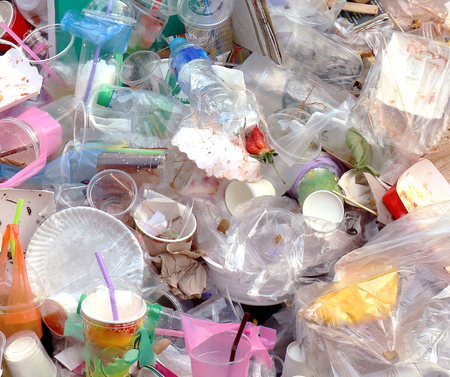
Sustain Kane: Why Not Give Plastic Free July a Try?
Plastics have impacted every aspect of our daily lives, from the bristles of our toothbrushes to the credit cards we swipe on pay screens. Plastics, which were developed and improved during the early 20th century, are commonly made from fossil fuels like natural gas and crude oil. When heated and distilled in a controlled environment, crude oil is separated into different chemicals, such as gasoline, paraffin, and naphtha. The hydrocarbons in naphtha are assembled into polymers (long, repeating chain molecules), which we encounter as plastics such as polyethylene (PE).[i]
Why are Plastics a Problem?
1. Recycling efforts have not kept pace with material consumption.
From 1980 to 2019, the use of plastics has grown considerably, from 75 million tons per year to 460 million tons globally. Of that 460 million tons, 353 million tons of all generated plastic enters the waste stream, with only nine percent of that plastic from around the world being recycled.[ii] This trend plays out similarly among American households, where plastic consumption has tripled from 1980 to 2019, yet less than a third of materials such as PET bottles, polypropylene containers, and HPDE bottles are recycled, due both to lack of access to recycling programs in certain areas and to inconsistent participation where programs do exist.[iii]
2. Plastics that aren't recycled are either landfilled or lost to the environment.
In Illinois, waste that is not recycled is landfilled. Plastics persist in landfills for hundreds of years. According to Illinois EPA's last estimate, there is 19 years of landfill capacity remaining in the state.[iv] Given the exponential increase in plastic waste and the longevity of plastics in landfills, this is clearly not sustainable. Plastics are often lost to the environment. Sometimes people litter, and lightweight plastics like single-use shopping bags and Styrofoam containers are easily blown out of garbage cans and trucks. In the environment when exposed to sunlight, plastics tend to break down into smaller and smaller particles. These particles, called micro and nano plastics, are showing up everywhere - in soils, drinking water, food crops, and in human bodies. It is not yet clear what the potential impacts on our health might be.
What is Plastic Free July?
Founded in 2011 as a key initiative of the Plastic Free Foundation (PFF), Plastic Free July seeks to raise awareness about reducing individuals' reliance on single-use plastics.[v] This year's campaign focuses on small changes that each individual can make, under the slogan “Small steps, big difference." PPF has developed educational resources on alternatives to plastics, social media pledge cards, a five minute quiz examining current plastics use, as well as optional emails with plastic reduction tips during the month. Access to these resources can be found at plasticfreejuly.org. Over the past five years, participants in Plastic Free July have collectively prevented 3.08 billion pounds of plastic from entering the waste stream![vi] This year, millions of people from 190 countries are expected to participate. Will you be one of them?
Five ways to participate in Plastic Free July
- Use a reusable water bottle
- Don't like your tap water? Consider using a filter pitcher, installing filtration system, or buying filtered water in bulk at the store.
- Use a washable container for lunch or snacks instead of a single-use baggie (BONUS) Call 630-208-3841 or email recycle@kanecountyil.gov during July & mention this article to get a free re-useable/washable snack and sandwich baggie!
- Swap bottled liquid soaps and shampoos for bar soaps
- Try coconut fiber (coir) based cleaning products
Swap out your food containers for wheat straw containers. They are made from wheat rice, hemp, flax and sugar cane which makes them much more heat resistant as well.
[i] https://www.bpf.co.uk/plastipedia/how-is-plastic-made.aspx
[ii] https://www.oecd-ilibrary.org/environment/global-plastics-outlook_aa1edf33-en
[iii] https://recyclingpartnership.org/residential-recycling-report/
[iv] https://epa.illinois.gov/topics/waste-management/landfills/landfill-capacity/2022.html
[v] https://www.plasticfreejuly.org/
[vi] https://www.plasticfreejuly.org/about-us/

